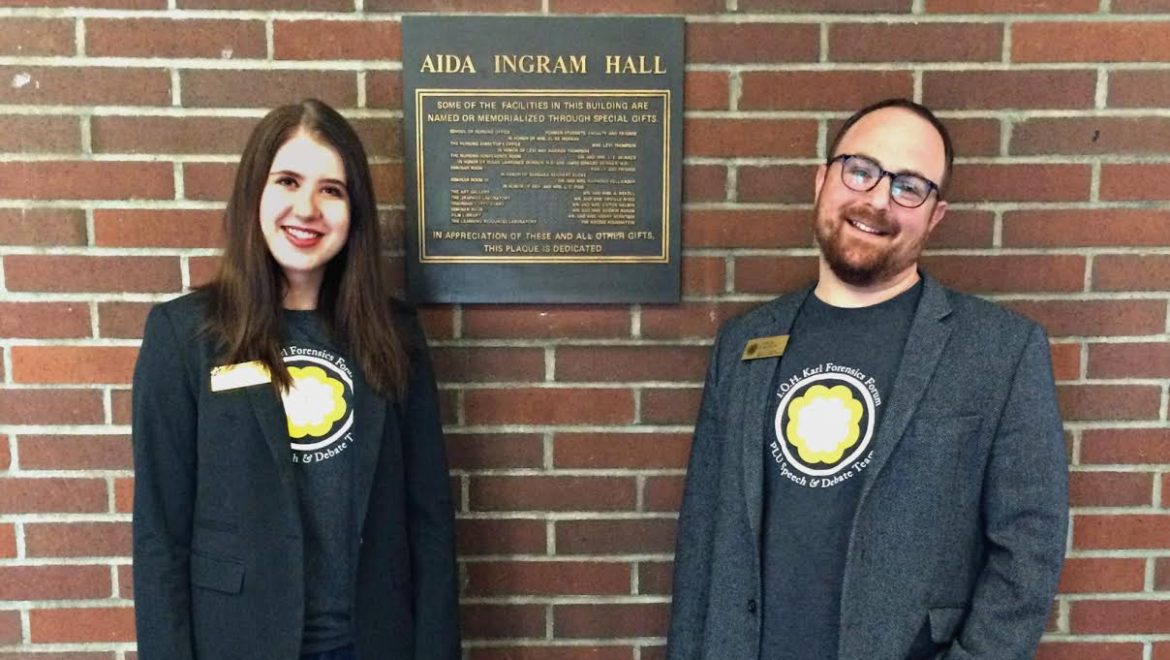Student writes of her student-faculty research experience
By Kaitlyn Hall ’17
Kaitlyn Hall is a senior Communication and Spanish major.
We study the past and the present to inform the future. Student-faculty research offers one of the university’s most valuable opportunities for collaboration and innovation, bringing together academics of diverse experience and interests.
Communication professor Justin Eckstein and I first met in a class centered on researching restaurant success. It started out as just any other class, a rung on the ladder toward a degree, but one opportunity changed it all: debate.
Eckstein’s role on campus wasn’t just limited to the classroom. As the director of the speech and debate team on campus, Eckstein encouraged students from his classes to participate in debates both on and off campus.
I liked to argue, sure, but I didn’t consider a trip to a debate tournament as anything more than an extra-credit opportunity until I was there, crammed in a small classroom while we cheered for our team completing at finals. Five months later, I began to a position working for the debate team as a public relations specialist.
October came, and a spark of inspiration appeared at the Ruth Anderson Public Debate. We wondered: Can technology improve the quality of deliberation over local issues?
It can, and it does.
Eckstein and I began considering working on research together in fall 2015, as I prepared for the transition to graduate school and Justin continued to expand his body of work.
During the Ruth Anderson Public Debate, hundreds of tweets flew back and forth between debate attendees. They were fact-checking one another and coming up with novel, innovative argumentation.
Eckstein and I pored over every tweet during the summer. We discovered how new arguments emerged and watched reasoning flow and evolve, paralleling and splitting from the debate happening feet away. We found they were participants, not just audience members, actively engaging in argumentation and leaving the event equipped to offer the best arguments for their perspective.
This augmented public debate was characterized, we discovered, by rapid invention of new ideas, increased audience engagement, and the extension of the public debate to the community. These new arguments spilled off Twitter into the broader public sphere. For example, Angie Tinker, one of the debaters featured in the Ruth Anderson Debate, reiterated key arguments from the debate when she appeared on PBS following the debate.
Eckstein traveled to Tokyo, Japan, to present our research at the Tokyo Conference on Argumentation, joined by argumentation scholars from all over the world. There, the work gained insight from scholars that will help shape continued research and works.
Stephen Llano, associate professor and director of debate at St. John’s University, attended the conference and was particularly positive. He wrote to Eckstein and said the analysis of the use of social media as a resource and response venue for public debates was both stimulating and novel yet deeply rooted in the relevant scholarship on debating, argumentation and blogging. He was eager to see the research continue.
Our research changed from something confined to meetings and highlighter marks and tallies, but something discussed internationally. Session attendees provided positive feedback: we were onto something that could change the face and future of public debate.
The spark hasn’t disappeared—it’s grown into a fire, spreading to burn new paths for opportunity and creativity in public debate. We continue to fine-tune and extend our research by participating in the Ruth Anderson Public Debate this past October and in other future debates.

